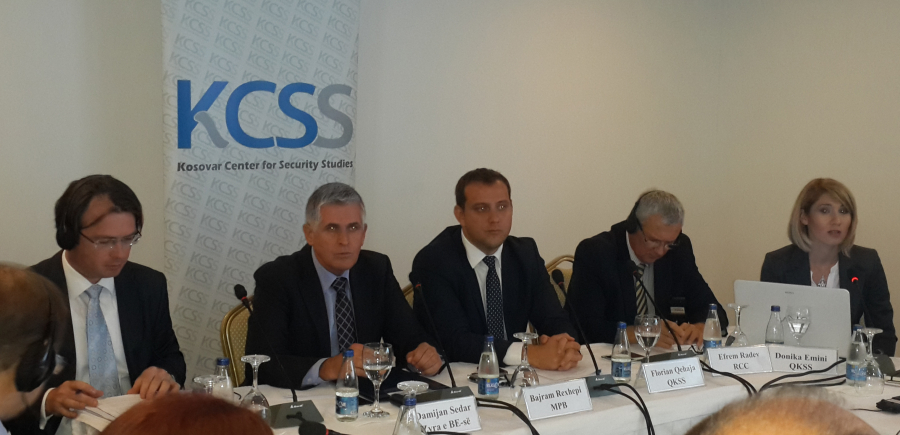10/09/2014

Today, on September 10th, the Kosovar Center for Security Studies (KCSS) published the policy paper entitled "Kosovo's Representation and Membership in Regional Security Initiatives".
The main purpose of this analysis is to highlight the progress made in this regards and to analyze the political context of regional initiatives, focusing on the challenges that Kosovo institutions have to become a full member of regional security initiatives.
In this conference, present as panelists, where: Minister on Duty of Ministry of Internal Affairs Bajram Rexhepi, Damijan Sedar, Senior Political Advisor of the European Union Special Representative in Kosovo and Efrem Radev, Senior Advisor on Security Policy Issues at Regional Cooperation Council (RCC). Mr. Rexhepi urged the European Union to be proactive in implementing the footnote agreement reached between Kosovo and Serbia, emphasizing the fact that the EU is a guarantee when it comes to the implementation of this agreement. Whereas, Mr. Sedar stressed that the process of regional integration initiatives is an inclusive process concluding that without the full involvement of Kosovo as an active member in all regional initiatives, it is impossible to speak of an effective cooperation in the Western Balkans. On the other hand, Mr. Radev, stressed that membership in regional security initiatives is conditional on two aspects: technical and political. He further said that one of the more technical aspects of regional cooperation is the participation of all countries in the region in these mechanisms. In addition to the panelists, the author of the publication also presented the preliminary findings of this analysis.
Recommendations
Kosovar Government – the signing of the ‘footnote’ agreement should be followed by a better platform for implementation. The government should be more consistent and unified in order to ensure better participation in regional security initiatives. Besides the strategies, a better cooperation and coordination among the MFA, the KSF and the KP is needed to enhance the positions of Kosovo regionally. Appropriate working institutions should address the issue of Kosovo within one or more regional frameworks, where interests identifiably include Kosovo. Participation in regional initiatives should not be a goal in itself, but a means to achieve the goal to strengthen the statehood and its institutions.
The European Union– should seek possibilities to involve Kosovo in relevant initiatives by exploring new options between different statuses in order to make sure that Kosovo fully participates in the regional security initiatives. Also, The EU should pressure the Government of Serbia to respect and implement the “footnote” agreement according to which, Kosovo should not be restricted from taking part in regional bodies and initiatives.
UNMIK and EULEX - should focus more efforts to handover the responsibilities to Kosovo national institutions, specifically in relation to the communication with Interpol and Europol. The regional security initiatives are expected to make efforts that would bring the overarching goal of regional cooperation beyond the position of member states. The regional security initiatives are encouraged to proactively justify the need for Kosovo’s membership in order to declare, at least formally, full and holistic cooperation in South East Europe.